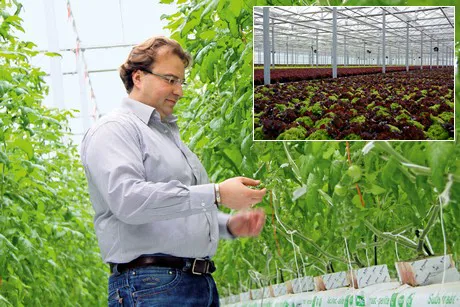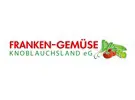When it comes to greenhouse vegetables, the German sales collective, Franken-Gemüse Knoblauchsland, competes directly with Dutch products. Florian Wolz is the Manager at this cooperative which was founded in 1970. He talks openly, but critically, about the latest developments in the sector.
Today, this company has 28 employees. Ninety percent of the 40 affiliated cultivation companies' products go directly to southern German retailers. In terms of percentage, tomatoes and cucumbers are the main greenhouse products. Nine percent of the total assortment is now also offered as organic.

Home advantage in jeopardy
“At present, there are several Dutch investors who are focussing solely on Germany. This is occurring in, among other sectors, fruit-vegetable cultivation. An entirely new greenhouse complex for hydroculture lettuce is to be realised in West-Germany. These discussions naturally also touch on the theme of regional production," he says.
“In our projects, we have already been growing in water on a smaller scale. Several growers have already reported that the may be interested in this. We are now implementing modern cultivation techniques. Thanks to this, the existing companies can continue for the next generation."
This reason is exactly why the new complex will be huge competition for the regional farmers in Franconia in Northern Bavaria. According to plans, it will be 10 ha in size. "At least five farmers and their families can live well from the same acreage. They will also be able to secure their future, from a technical point of view."
Regional cultivation
A cultivation complex of this magnitude in Germany would give Dutch investors the advantage in regional cultivation. The proposed location is in Bavaria. They can, therefore, label the products cultivated here with the 'Qualität aus Bayern' origin of region label. Retail sales figures indicate that this label is a significant factor with Bavarian consumers. These people are often locally-orientated.
“The fruit and vegetable sector has been working with regional labels for about ten years now. We have noticed that clients greatly appreciate this. They buy good quality products. In doing so, they support Bavarian companies. They also buy regionally grown products," says Wolz.
"This gives people the feeling that they mean something to the region." For this reason, these new close relationships between growers and consumers also attract overseas investors. These investors see opportunities in contract farming in the Bavarian region.
The power of innovation
Hydroponics has been done in the Netherlands and Belgium for more than ten years now. This cultivation method made its way into Bavaria in 2014 too. It is, therefore, a relatively new cultivation system, says Wolz. “I assume that water cultivation certainly has a future for lettuce varieties. It is also the future."
This assumption does only have to do with water consumption. It has to do with the current climate change too. This factor is increasingly affecting outdoor cultivation. "We are dealing with increasingly longer dry weather phases and extreme weather. It stays warmer for longer in the autumn too. We also often have to deal with late frost in the spring. These adverse weather conditions are all at the expense of the products' quality."
Wolz believes in closed-off cultivation. People can grow products more efficiently for longer. Most of all, they can do so in a meaningful way. "Both quality and quantity are no longer dependent on the weather," he explains.
"This means people can harvest their products for twelve months of the year." By using this new cultivation method, people can also save space. "With only one hectare of hydroculture, we can replace three to five hectares worth of full soil cultivation."
This industry leader lauds the innovative power of the younger cooperative members. However, he also sees a certain reluctance within the German sector when it comes to new cultivation methods. "Dutch people are more willing to make large investments. I see this reflected in my own cooperative."
"It is precisely those businesses who want to switch from full soil to greenhouse cultivation. They often wait too long, and then someone else beats them to the punch. It is also worth mentioning that we can already supply the whole of Bavaria as well as parts of Baden-Württemberg. This, with our existing two hectares of hydro cultivation. With this knowledge in hand, we are looking critically at the ten planned hectares in Wiesentheid.”
Nevertheless, the mood around the new competition is not necessarily negative, Wolz emphasizes. "These plans are very well thought-out. We cannot blame either the Bavarian growers or the Dutch ones, with their high-tech acreages, of being unaware of current developments. Despite this, we want to offer our growers a bright future."
Regional products for the premium sector
“We have come under pressure in the market in the last two years. This pressure was due to these exciting developments. Here, at our organization, until recently, regional products were equal to premium ones. This means we exceeded our goal to some degree. However, with this strategy, we ensured a good market position. We, thereby, also expanded our acreage," Wolz continues.
"The next step that was planned was premium items such as cherry tomatoes. They were to be brought to market using the regional label. But national discounters have increased their centralized purchasing. This means our strategy was not completely successful."
Wolz has great respect for their competitors. "We must admit that our Dutch colleagues have their affairs well in order. When we launch something new and can deliver the product at a regional level, we are satisfied. We get the idea that we are now on the map."
"In contrast, Dutch cultivation companies, with their acreage and clout, are far more consistent in their movements. This consistency not only applies to quantities but also for product presentation such as packaging and marketing. An example of this is the maximum taxation of trucks. This has been precisely adjusted to large and small product packaging. We can hardly compete against this efficient way of working."
This precision is in direct contrast to the more standardized packaging policy within the German sector. Many Dutch companies are also in the position to supply the entire Republic of Germany year round. This is a huge advantage when it comes to partnering with large retails chains.
“Our strategy to link regional production to premium sales did not go as planned on several fronts." Wolz explains that when it comes to fruit and vegetables, there are three segments with the German retail sector. "There is a basic segment. Here, there are always lower prices and poorer quality. This segment can certainly not be ignored."
"Then there is the classic middle-class segment which has almost completely disappeared. Nowadays, this sector is almost completely covered by regional products. Lastly, there is the premium segment. Here, quality, year-round availability, marketing, and product presentation play a vital role." In this respect, Dutch products have a large share in two of the German retail product segments. Expansion into the Bavarian region would, ultimately, also endanger the last bastion of regional cultivation in the German area of Knoblauchsland.
Looking toward the future, Wolz, however, wants to learn from the competition. "We will not be able to reach our intended level of quality so quickly. If only because our German energy policy is detrimental compared to those of our neighboring countries. Certainly when it comes to lit cultivation."
For standard items, in general, a complete transition is too much. Mostly because the products' prices fluctuate wildly. Consumers also do not feel enough of a connection to these products. Lit cultivation is, therefore, only a possibility for specific products.
Wolz sees sustainability as the most essential factor in convincing people in the future. This factor is undoubtedly not the case when it comes to lit cultivation. "On the other hand, we see a major advantage in hydroponics compared to conventional cultivation methods. Hydroponics is very environmentally-friendly," Wolz concludes.
The (slightly adapted) article appeared earlier in edition 4, the 33rd volume of the trade journal, AGF Primeur. See www.agfprimeur.nl for this.
For more information:
Franken Gemüse
www.franken-gemuese.de
Florian Wolz
[email protected]
